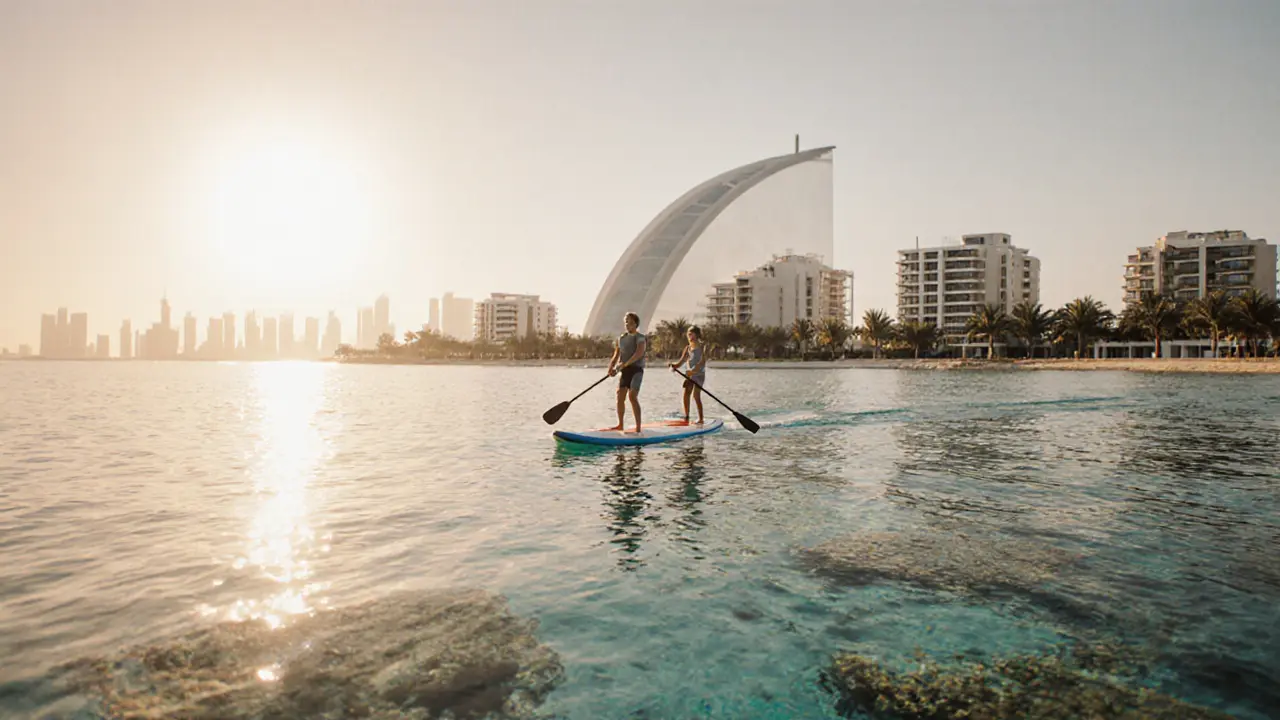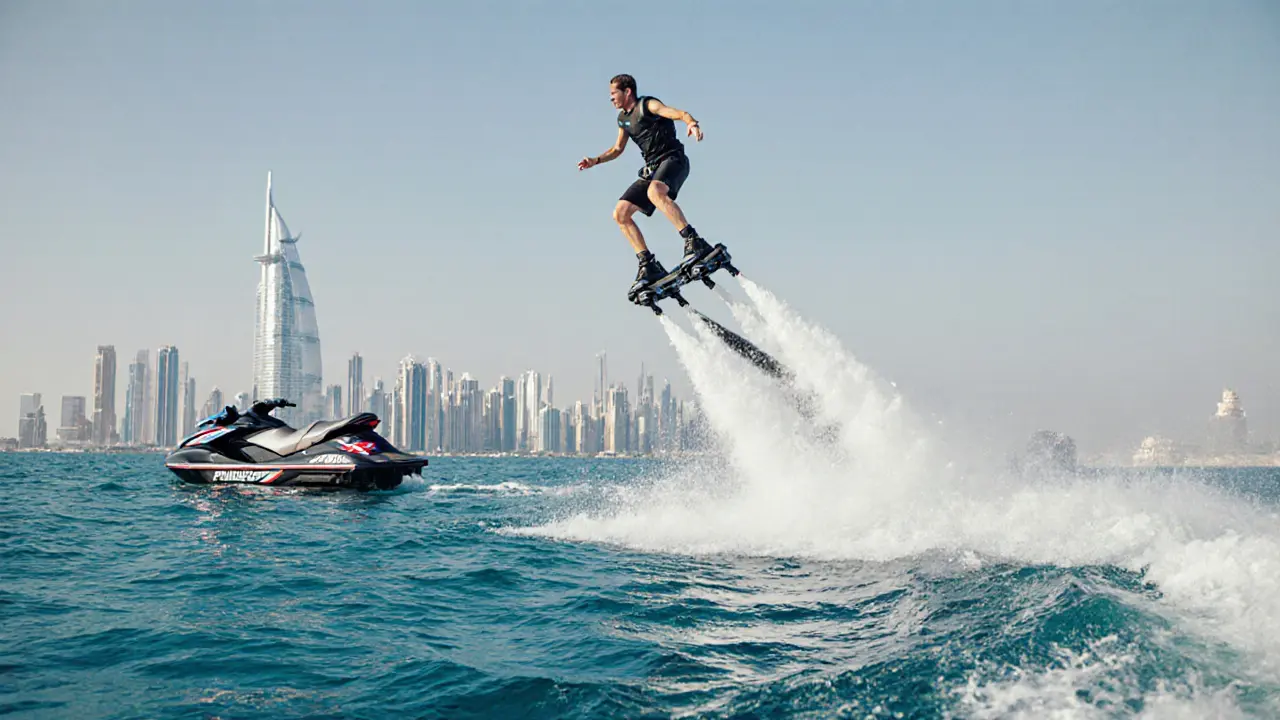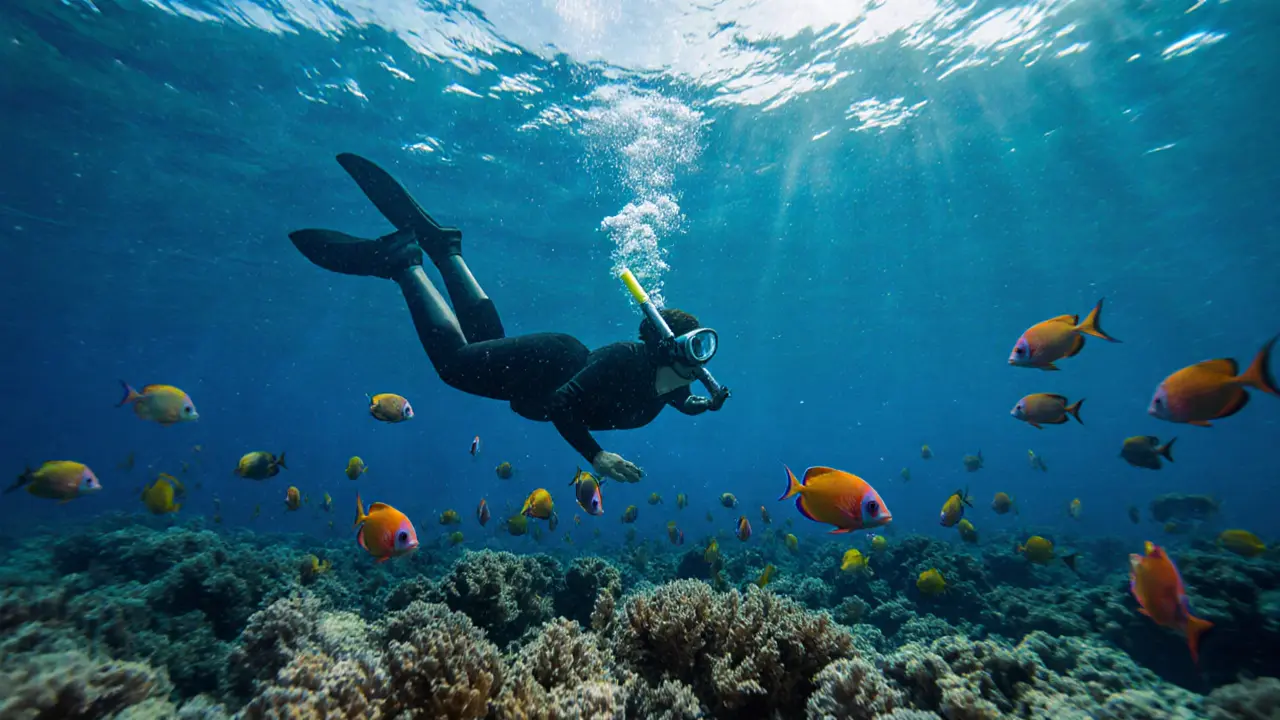
When you think of Palm Jumeirah, you probably picture luxury hotels, golden beaches, and skyline views that look like they’re from a movie. But beneath all that glitz is a real playground for anyone who loves being on the water. This artificial island isn’t just for selfies and five-star resorts-it’s one of the best places in Dubai to get your adrenaline fix, whether you’re a beginner or have been riding waves since you were a kid.
Why Palm Jumeirah Is Perfect for Water Sports
The shape of Palm Jumeirah creates calm, protected waters along its crescent and trunk. Unlike open ocean spots where waves can be unpredictable, the inner lagoon here stays mostly flat, even on windy days. That makes it ideal for learning new skills without the fear of getting tossed around. The water is clear, warm most of the year, and teeming with marine life you won’t find in other parts of the city.
Plus, there’s no shortage of operators. From beachfront kiosks near Atlantis The Palm to floating platforms near the Monorail station, you can rent gear, book lessons, or join guided tours with zero hassle. Most places offer gear for all ages and skill levels, and many include safety briefings and certified instructors.
Top Water Sports You Can Try Right Now
Here’s what’s actually happening on the water at Palm Jumeirah today, based on what locals and visitors are doing in late 2025:
- Jet Skiing - The most popular activity. Rentals start at AED 150 for 15 minutes. You can zip around the outer rim, weave between yachts, or even follow a guided route that takes you past the Palm’s iconic villas. Some companies offer dual jet skis so you can ride with a friend.
- Paddleboarding - Calm lagoon waters make this the perfect spot to try stand-up paddleboarding. Many beginners stand up for the first time here without falling. Guided sunset paddles are especially popular-gliding past the illuminated Palm at dusk is unforgettable.
- Snorkeling - Forget the rocky reefs of the UAE’s east coast. At Palm Jumeirah, you’ll find artificial reefs placed along the breakwater near the western side of the island. These reefs attract parrotfish, groupers, and even the occasional octopus. Gear rentals include masks, fins, and snorkels; no certification needed.
- Parasailing - Lift off from the beach near Nakheel Mall and soar 150 meters above the island. You’ll get a bird’s-eye view of the entire Palm, the Dubai skyline, and the Arabian Gulf. Flights last 8-10 minutes and are safe for kids over 8 with a guardian.
- Wakeboarding and Waterskiing - For those who want speed, there are dedicated tow zones off the eastern side of the trunk. Operators use electric tow boats that are quieter and more eco-friendly than older gas models. Lessons start at AED 350 for 30 minutes, including equipment and coaching.
- Jetovator and Flyboard - If you’ve seen videos of people shooting out of the water like Iron Man, that’s a Flyboard. It’s been growing in popularity here since 2024. Trained instructors control the thrust from a boat, so even first-timers get airborne within minutes.
What Makes These Activities Different From Other Beaches in Dubai
Other beaches like Jumeirah Beach or Kite Beach are great for swimming and sunbathing, but they’re crowded, noisy, and often packed with families and tourists just lounging. Palm Jumeirah’s water sports scene is different because it’s designed for action.
First, the infrastructure is built for it. Dedicated launch ramps, floating docks, and safety buoys mark zones for each activity. Second, the water is consistently cleaner thanks to regular maintenance by the Palm’s management. Third, you’re not sharing space with swimmers or paddleboarders-you’ve got your own lanes and timeslots.
Also, many operators now offer eco-conscious options. Some jet ski tours now use electric models. Snorkeling tours include reef education. Even the rental gear is often made from recycled materials. It’s not just fun-it’s becoming more responsible.

When to Go and How to Avoid Crowds
Weekends, especially Friday and Saturday afternoons, are packed. If you want space and calm, go on a weekday morning. Between 7 a.m. and 10 a.m., you’ll have the lagoon almost to yourself. The water is cooler, the light is golden, and you can hear nothing but the waves and your own breath.
Summer months (June to August) are hot-think 40°C-but the water stays around 32°C, so it feels refreshing. Most operators have shaded waiting areas and free water. Winter (November to March) is peak season, so book ahead. If you’re visiting in November, like now, you’re hitting the sweet spot: cool evenings, sunny days, and fewer tourists.
What You Need to Bring and What’s Provided
You don’t need much. Most rental places give you:
- Safety vest
- Helmet (for jet skiing and flyboarding)
- Snorkel gear
- Board or ski
- Basic instruction
Bring:
- Waterproof phone case (you’ll want to take photos)
- Quick-dry towel
- Sunscreen (reef-safe, non-nano zinc oxide)
- Light cover-up or rash guard
- Drinking water
Leave your jewelry, expensive watches, and flip-flops behind. Most places have secure lockers, but it’s easier not to bring valuables at all.
Pro Tips for First-Timers
- Start with paddleboarding or snorkeling. They’re low-risk and let you get comfortable with the water.
- Ask for the instructor’s name. Reputable operators train their staff, and you’ll want to know who’s guiding you.
- Don’t go with the cheapest deal. If it’s under AED 100 for a jet ski ride, it’s likely an old machine or no safety check.
- Check the wind direction. If it’s blowing hard from the north, the lagoon gets choppy. Ask staff for the best spot that day.
- Book a combo package. Many places offer a 2-activity bundle (like jet ski + snorkel) for 20% off.

Where to Eat and Chill Afterward
After you’re done, head to one of these spots:
- The Beach House - Right on the shore, with fresh seafood and cold drinks. Their coconut water smoothies are legendary.
- Shake Shack at Palm West Beach - If you’re craving a burger and fries, this is the cleanest, fastest option.
- Al Mahara Lounge - Upscale but relaxed. Order the mint tea and sit on the deck with your feet in the sand.
Most places have outdoor showers so you can rinse off salt before heading to the restaurant.
What’s New in 2025
This year, two big changes are making Palm Jumeirah’s water sports scene better:
- Electric Jet Skis - Five operators have replaced gas-powered models with silent, zero-emission electric skis. They’re quieter, faster to start, and don’t leak oil.
- Underwater Audio Tours - Some snorkeling packages now include waterproof headphones that play audio about the reef’s ecosystem as you swim. You hear facts about the fish you’re seeing in real time.
These aren’t gimmicks-they’re signs that the island is evolving to be more sustainable and educational.
Final Thought: It’s Not Just a Tourist Spot
Palm Jumeirah doesn’t feel like a theme park. It feels like a living, breathing extension of the sea. Locals come here after work to paddleboard. Families book weekend snorkeling trips. Couples rent jet skis for sunset rides. It’s not just about the thrill-it’s about connection.
Whether you’re chasing adrenaline or just want to float in clear water with fish swimming beneath you, Palm Jumeirah delivers. And unlike other Dubai attractions that fade after a few hours, this one sticks with you. You don’t just remember the view-you remember how it felt to be out there, moving with the water.
Can beginners try water sports at Palm Jumeirah?
Yes. Most water sports operators on Palm Jumeirah cater to first-timers. Paddleboarding, snorkeling, and even jet skiing come with short training sessions and safety gear. Instructors are trained to work with people who’ve never been on the water before. Many guests are complete beginners.
Is it safe to snorkel at Palm Jumeirah?
Yes. The artificial reefs are shallow, with depths ranging from 1 to 3 meters. Marine life is non-aggressive, and there are no strong currents in the lagoon. Operators provide buoyancy aids and monitor snorkel zones. You’ll often see lifeguards on jet skis patrolling nearby.
Do I need to book water sports in advance?
For weekends and holidays, yes. Popular activities like parasailing and Flyboarding fill up quickly. Weekday mornings are usually walk-in friendly. If you’re visiting in November or December, booking 24-48 hours ahead saves time and guarantees your preferred time slot.
Are there age limits for water sports on Palm Jumeirah?
Yes, but they vary. Snorkeling and paddleboarding have no strict age limits-kids as young as 5 can join with a guardian. Jet skiing and Flyboarding require participants to be at least 12 years old. Parasailing allows kids from age 8 with parental consent. Always check with the operator before booking.
Can I bring my own gear?
You can bring your own snorkel gear, but most operators require you to use their jet skis, boards, or Flyboards for safety and insurance reasons. If you have your own wetsuit or rash guard, feel free to use it. Some people bring their own waterproof cameras, but most places offer GoPro rentals.
What’s the best time of day for water sports?
Early morning (7-10 a.m.) is ideal. The water is calmest, the temperature is comfortable, and you’ll avoid crowds. Sunset sessions (4-6 p.m.) are great for photography and romantic rides. Avoid midday (11 a.m.-3 p.m.) when the sun is strongest and winds pick up slightly.
Are there any restrictions on where I can go?
Yes. Jet skis and fast boats are restricted from entering the lagoon’s inner zones near villas and private beaches. Snorkelers are asked to stay away from coral structures to protect them. Operators provide maps or GPS boundaries before you head out. Always follow their instructions.
Is it worth it for families with young kids?
Absolutely. Paddleboarding and snorkeling are gentle enough for kids. Many operators offer family packages with discounted rates for groups. There are shallow areas near the shore where toddlers can splash safely. Just make sure to supervise closely and choose operators with child-sized life vests.




